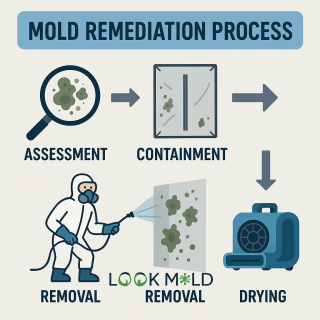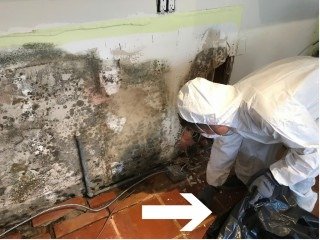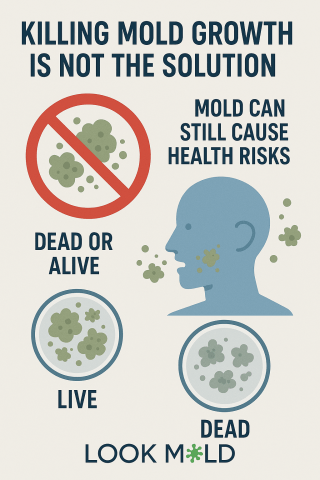Professional Mold Remediation Services
Don't Let Toxic Mold Put Your Family's Health at Risk
Stop mold damage before it spreads. Call now for a free, no-obligation estimate from a local remediation expert.
Free Estimate · Zero Obligation · Available 24/7
When Is Mold Remediation Required?
There is a dark side to the mold industry that you simply have to know...
Or you may find yourself in thousands of dollars of debt — or even with a worse mold problem than you originally had!
So if you're trying to figure out when you should hire a professional, keep reading because this guide could help you avoid a crucial mistake.
The Difference Between Mold Removal And Mold Remediation
"Mold removal" and "mold remediation" are often used interchangeably — but technically, they're not the same thing.
- Mold removal is just one part of the remediation process.
- Mold remediation is a broader strategy that may also involve sanitizing and preventing further growth.
You'll also see terms like mold extraction or mold abatement. These are all synonyms for the same process.
The real goal: Remove or treat mold while preventing contamination from affecting other areas of the home and its occupants.
When Is Mold Remediation Necessary?
Mold remediation can sound intimidating — and while it can be serious, it's not always a cause for panic.
There are typically some mold spores in every indoor environment, especially in warm and humid areas.
However, when mold is actively growing, especially on porous surfaces or due to water damage, it needs to be handled properly.
If mold is only present on the surface (and not feeding on the wall or material), it might be cleaned and sealed with an anti-microbial coating.
EPA says:
"If the moldy area is less than about 10 square feet... you can handle the job yourself."
Source
Still, keep in mind: Mold spores can still be harmful when dead, and improper handling can make things worse.

What Is The Cost Of Mold Remediation?
People always ask about mold remediation costs. The truth?
It depends on your property and the scope of damage.
- Minor infestations: $400
- Average cost: $1,111–$3,211
- Major problems: $10,000+
Source: Improvenet.com
National Average: $2,272 (HomeAdvisor)

⚠️ Note: These estimates are likely pre-pandemic. Prices today are likely higher due to inflation and materials/labor increases.

Why Killing Mold Growth Is Not The Solution
Many homeowners obsess over killing mold. But here's the truth:
Dead mold spores can be just as harmful as live ones.
You need 3 things for mold to grow:
- Water
- Humidity
- Food (organic material)
Remove any one of them, and the mold stops growing — but that doesn’t mean it’s safe.
Dry mold becomes light and more easily airborne, which increases health risks.

Who Do You Call To Determine If You Need Mold Remediation?
There are two sectors in the mold industry:
- Mold Inspectors (Assessors) — perform inspections, sampling, air quality checks, and write remediation protocols.
- Mold Remediation Companies — carry out the removal, sanitization, and build-back (if needed).
🎯 Important: The same company should not perform both inspection and remediation — this is illegal in some states and leads to conflict of interest.
Get recommendations from your inspector, but always request three options and confirm there's no bias.
Emergency Water Damage Clean Up
Emergency water damage restoration is the first step before mold remediation. If a leak is caught early, mold remediation may not even be needed.
How Do You Know If It's An Emergency?
- If your house is soaked and mold has already started growing — it's too late.
- But if it's caught within a few hours, you can potentially avoid major damage.
Calling a Water Damage Restoration Company
Look for services like:
- Emergency Dry-Out
- Emergency Water Extraction
- Water Damage Restoration
Your insurance company may provide a vendor, but if they’re unavailable, call a 24/7 emergency restoration company directly.
Hiring A Mold Remediation Company
If it’s too late for a dry-out and you have visible mold, you’ll need to hire a remediation pro.
What To Look For:
- Licensed mold remediation specialists
- Avoid general contractors unless specifically trained
- Small companies often have the owner on-site (this is a good thing!)
Obtain Multiple Estimates
Talk to at least three different companies. Expect some variance:
- One may understate the problem
- One may exaggerate
- One may be reasonable
📌 Do not go with the lowest bid just because it’s cheaper — it may be a scam.
Unrealistically low bids can turn into the most expensive jobs once "unforeseen issues" arise.
Avoid Untrained Contractors
Just because someone can do mold remediation doesn’t mean they should. Licensing exists for a reason.
Who’s Doing the Work?
Franchise companies may send unlicensed laborers. Ask if licensed staff will be on-site doing the actual work.
Is It Safe To Stay In The Home During Remediation?
Only your remediation pro can determine this. If the entire home is affected, you should not stay there.
Black Mold Removal
"Black mold" refers to Stachybotrys, a toxic mold species. Many contractors use the term to scare homeowners and inflate prices.
Regardless of the color, all visible mold on porous surfaces should be removed.
Should You Hire A Mold Remediation Company Or DIY?
💬 Look: I'm not a fan of homeowners doing this themselves.
Disclaimer
There is real training involved in mold remediation — OSHA, licensing, proper equipment, and safety standards.
DO NOT DIY mold remediation for areas larger than 10 square feet.
It’s not just about cleaning — it’s about sealing, filtering air, and protecting your HVAC system, wood, and crawl spaces.
❓ Frequently Asked Questions
When is mold remediation required?
Mold remediation is necessary when mold is actively growing on building materials, especially after water damage or when visible mold covers more than 10 square feet.
Can I do mold remediation myself?
DIY mold cleanup is only safe for areas under 10 square feet. Anything larger should be handled by professionals.
How much does mold remediation cost?
Costs range from $1,000 to over $5,000 depending on severity, location, and materials affected.
Who should I call first: an inspector or remediation company?
Always call a mold inspector first. They can write a remediation protocol and avoid conflicts of interest.
Is it safe to stay home during remediation?
Sometimes yes, sometimes no — your remediation company will assess this based on the location and size of contamination.
Final Thoughts
- Mold remediation is more than just cleanup — it's a specialized process.
- Hiring the right company can save your home and health.
- Avoid scammers. Get estimates. Know the law.
- When in doubt, hire a qualified inspector first.
Explore Related Topics:
Notice an update we should make?
We strive for accuracy. Contact us here if you see incorrect or outdated info on this page.
